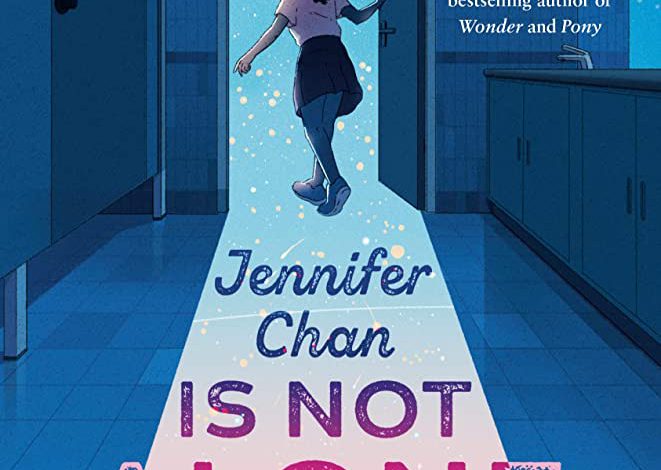Readers will likely relate to the popularity food chain and power plays that transpire in junior high school. This social dynamic is the focus of Tae Keller’s middle grade novel Jennifer Chan Is Not Alone. With this book, Keller takes readers to the seventh grade classroom of Gibbons Academy in Florida and explores themes like identity, anxiety, friendship, bullying, and redemption. She also invites us to wonder whether we are truly alone in the universe and whether other life might exist beyond Earth.
Mallory Moss is struggling to define herself—is she a fun, brave, and trustworthy friend or a timid, insecure, and fearful follower? Believing that everyone is watching and judging, Mallory is prone to anxiety. But Reagan Meyer—one of the popular girls—makes Mallory’s worriers seem smaller. When Jennifer Chan moves into the neighborhood, Mallory finds herself drawn to Jennifer’s confidence but also wary of some of her convictions. For example, Jennifer believes in aliens, seems oblivious to the invisible audience of watchers, and doesn’t abide by many of the unspoken rules governing the social hierarchy. After a few weeks of bonding and sharing time with Jennifer, Mallory distances herself, fearful about potential backlash from Reagan.
When Jennifer’s quirky nature begins to draw people to her, Reagan teams up with Tess and Mallory to teach Jennifer a lesson about “her place.” After this “Incident,” Jennifer turns up missing. Mallory isn’t sure whether Jennifer has run away, been abducted by aliens, or fallen victim to something more sinister.
As Mallory struggles to do the right thing, Keller invites her readers to do their own soul-searching, to consider why humans judge or bully people for their differences. Kath, another of Keller’s characters, names a common fear: “I didn’t want to turn us into targets. . . . It’s like I don’t even know myself, because I want to think I’m a good person. I see people who don’t do the right thing even though they know the right thing, and I always think . . . I want to be better than that” (123).
When she examines her own behavior and motives, Mallory realizes “it is so easy to talk bad about someone. It’s so easy to bond over hating someone else. It’s almost scary how naturally it comes” (125-126). She begins to wonder how she has spent so long being friends with someone she doesn’t like and then allowed herself to be turned into someone she doesn’t like either. She also wonders how many people secretly hurt one another and whether there is hope for humanity—maybe humans really are just bad.
Although Keller’s novel touches raw and vulnerable places and reminds us how intellectual curiosity makes life messy, it also gives us hope that the world can be a better place if we’re willing to put in the work. While we all want to be seen, to be chosen, to be understood and accepted, we have to be mindful of our power to choose and the consequences that occur when we try to rob someone else of power or when we give our power away by allowing someone else to choose for us.
As Mallory wrestles with who she is and who she wants to be, readers will relate with her moral and human dilemmas. Home lives, school lives, dreams, and insecurities all factor into behavior and will impact how we treat ourselves and others. When we are angry and hurting, bullying others gives us a sense of power, a target for our pain and anger. The hope is that we realize this before irreparable damage occurs.
- Posted by Donna

